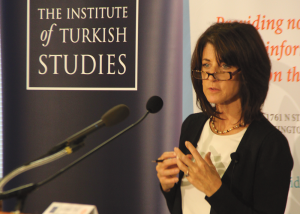
The panel included Denise Natali of the Insititute for National Strategic Studies at the National Defense University, and Kadir Utsun, research director at the SETA Foundation.
The Institute of Turkish Studies and the Middle East Institute co-sponsored a panel on Turkey, the Islamic State group and the Middle East on Wednesday in McShain Lounge.
A panel of experts led by Sinan Ciddi, executive director of the Institute for Turkish Studies, included Denise Natali, who holds the Minerva Chair at the Institute for National Strategic Studies at the National Defense University, Kadir Ustun, the research director at the SETA foundation and Mutlu Civiroglu, a journalist whose field of work involves Turkey and Syria.
The group discussed Turkey’s relationship to the turmoil between the Islamic State group and the Kurds in Iraq. Turkey finds itself at a nexus, with its status as a geographic neighbor to the conflict and a key NATO ally of the United States, which recently began airstrikes against the Islamic State group in Syria and Iraq.
“Turkey is expected to play an important role in [world events],” Director of the Middle East Institute’s Center for Turkish Studies Gonul Tol said. “A few days ago, it was signaled that Turkey might become part of the military coalition. Now there is a huge debate on what exactly [they] will do.”
Ciddi said that the panel discussion was meant to help elucidate the current events in the region during a time of decision-making.
“It is a timely topic, we think, because of Turkey’s proposed role for what is happening in northern Syria and Iraq with the spread of the ISIS threat,” Ciddi said. “[This panel is designed to] shed light on some of the most urgent questions that are being asked.”
The discussion began with remarks from each speaker, with Natali beginning by examining the divide between the Kurdish people. Natali said she is unsure if regional Kurdish groups such as the Kurdish Regional Government and the Kurdistan Workers’ Party, also known as PKK, can work together to fight a common enemy.
“I actually am pretty skeptical even about how far this so-called alliance, if you even want to call it that, between the KRG … and the PKK can go,” Natali said. “[They are] in direct competition with each other. That competition still exists today. … The extent to which this competition for leadership of the Kurds and to direct the nature of the Kurdish nationalism should be taken into account, because that did not change after [the Islamic State’s rise].”
Ustun said that allies around the world need to develop a unified plan to aid the Kurds and put an end to the violence in the area.
“The U.S. and the allies including Turkey have failed to find a common strategy … to support the Syrian opposition and create credible alternatives to the Assad regime,” Ustun said. “The chaos and vacuum created by the civil war in the past few years have created a breeding ground for terrorist organizations.”
According to Utsun, the current United States strategy suffers from “bomb-and-walk-away syndrome,” a tendency to intervene militarily in a country and then not follow up with aid or infrastructure improvements.
“There is no actual political goal or political strategy defined, at least what we can see publically by the U.S. that will resolve the issues on the ground,” Utsun said.
The panelists’ initial speeches were followed by a question-and-answer session, during which the panel fielded questions about decision-making in Turkey, Iran’s involvement and the Turkish position.
Deniz Citak (SFS ’17), who attended the event, said that he found the discussion to be both fascinating and informative.
“I studied Persian and I’m really interested in the Middle East and I’ve studied some Arabic, so obviously ISIS and the Middle East are going to be topics [I’m concerned with] and I think Turkey is real interesting,” he said.
Citak, who is half Turkish, was intrigued by the topic.
“Currently, our government’s a little unsure of what to do with the question of ISIS and Turkey despite its proximity has been very hesitant … and I guess that was because of the hostages who are now out, so we’ll see,” Citak said.




















